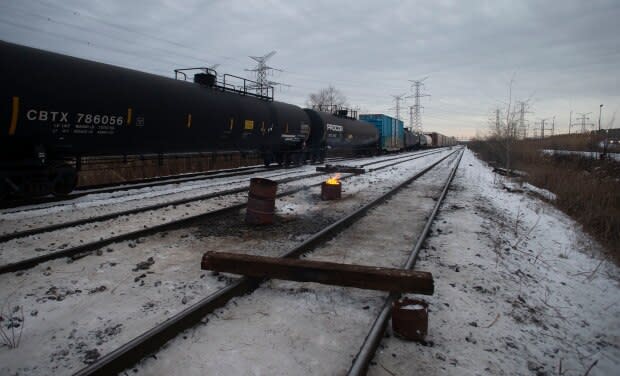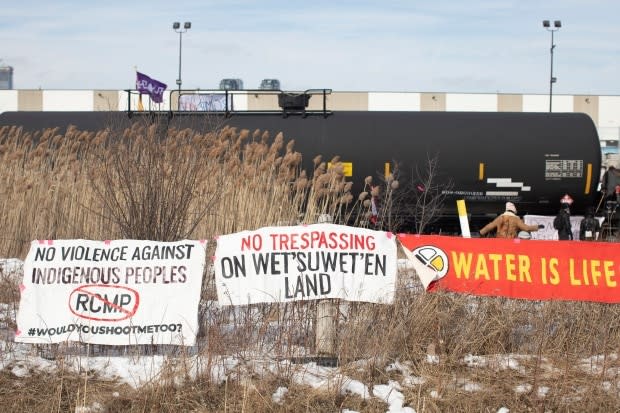Rail blockades to lead to shortages of propane and consumer goods, 2 national groups say
Two national organizations are warning that there could be shortages of propane and consumer goods in Canada if the current rail blockades continue.
Spokespeople for the Canadian Propane Association and the Retail Council of Canada said on Sunday that they are concerned and frustrated in particular about the impact of the blockade near Belleville, Ont. on Tyendinaga Mohawk territory that has shut down train service across much of Eastern Canada.
The blockade entered in its 11th day on Sunday. CN Rail has obtained a court injunction to end the protest, but the Ontario Provincial Police have not yet enforced it.
Similar blockades across the country have cut both passenger and freight rail services, with pressure mounting on the federal government to bring them to an end. The protests are in solidarity with the Wet'suwet'en hereditary chiefs opposed to the LNG pipeline in northern B.C.
Nathalie St-Pierre, president and CEO of the Canadian Propane Association, said there is already rationing of propane in Atlantic Canada, Quebec is thinking about rationing the fuel, and there are long wait lines for trucks to be loaded with propane in Ontario.
"Obviously, there are some issues if nothing is being transported by rail," St-Pierre said. "Thank goodness the winter is pretty mild at this time. The demand is a bit softer than usual."
In Ontario, there is still access to propane through Sarnia, Ont. by pipeline, but then the propane has to be transported by rail or by truck. There are wait times of eight to 10 hours in Sarnia for trucks to be loaded with propane, she said. Trucks from other provinces are going to Sarnia because they are not receiving shipments.
She said the waiting times are "critical" and not what she would consider "normal."
St-Pierre said there are not enough trucks to sustain the demand for propane. The fuel is used in commercial, institutional and residential settings, she said. Forty per cent of Canada's propane consumption is in Ontario.

Thousands of Canadians use propane to heat their homes, while many businesses and industries use it in their operations. Farmers use to keep livestock warm in barns, for example. Many services, including police, school buses and taxis, use it as a transportation fuel.
"They are talking about continuing the dialogue. But at the same time, and from probably everyone's perspective, you have to lift the blockades. You can have the dialogue, but at this time, I think the point was made," she said.
"I don't think they need to hold all of the Canadian economy hostage and not being able to function. The pressure is mounting."
Superior Propane, a Mississauga based company, said in a news release last week that it is predicting "critical supply shortages" of propane in Central and Eastern Canada if the blockades continue.
Karl Littler, senior vice president, public affairs, of the Retail Council of Canada, said there will be shortages of household products and consumer goods if the blockades continue. Such goods could include personal hygiene products, infant formula, both cleaning and sanitary products. There is also concern about the shipping of fresh food.
Littler said the blockades affect finished products ready to be put on store shelves and raw materials needed for manufacturing.

"We are concerned about it," Littler said. "There is an inability to move goods cross country through the various choke points. It's of major concern to retail merchants. It both interrupts the flow of retail ready goods and hampers the manufacturing process for Canadian manufacturing."
Littler said the council respects the right of people to engage in peaceful protest, but said injunctions have been issued and not all have been enforced. The blockades have implications for the health and safety of Canadians, he added.
"Obviously, we support the right to peaceful protest," he said. "Our primary concern is, the longer these blockades drag on, the more there is a risk that food and consumer goods will not get through to retail outlets, and obviously, that then affects the daily consumption that Canadians need."
The council, which represents 45,000 storefronts in Canada, has contacted the federal, Ontario and B.C. governments about the issue.

